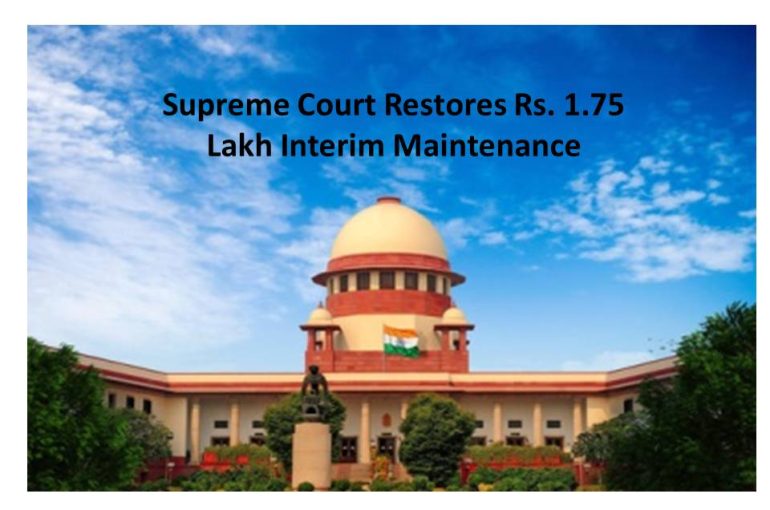Supreme Court Restores Rs. 1.75 Lakh Interim Maintenance
In a significant judgement that underlined the importance of fairness and transparency in matrimonial disputes, the Supreme Court of India, in Dr. Rajiv Verghese v. Rose Chakkrammankkil Francis (2024 INSC 876), reinstated the interim maintenance of Rs. 1.75 lakh per month to the estranged wife. The judgement, delivered on November 19, 2024, reflects the judiciary’s commitment to safeguarding the financial security of dependent spouses during matrimonial litigation.
Background of the Case
The case stemmed from the marital discord between Dr. Rajiv Verghese, a cardiologist, and his wife, Rose Chakkrammankkil Francis. The couple, married in 2008, separated in 2019 when Dr. Verghese filed for divorce under the Indian Divorce Act, 1869, citing incompatibility and cruelty.
In response, Ms. Francis sought interim maintenance of Rs. 2.5 lakh per month, claiming she was financially dependent and highlighting her husband’s substantial income from multiple sources. The Family Court awarded her Rs. 1.75 lakh per month, a decision later modified by the Madras High Court, which reduced the maintenance to Rs. 80,000 per month.
Dissatisfied with the reduction, both parties appealed to the Supreme Court, where the wife sought a restoration of the original amount, and the husband sought a further reduction.
Supreme Court’s Observations
The Supreme Court Division Bench, critically analysed the evidence presented by both sides and made several key observations:
1. Comprehensive Evaluation of Income
The Court found that the High Court erred in narrowing its focus to only two sources of income:
Verghese’s salary of Rs. 1.25 lakh as a cardiologist.
Partial rental income from a shared property.
The Family Court had rightly considered additional factors, such as the husband’s ownership of multiple properties, rental income from other assets, and possession of a school. Importantly, the husband failed to substantiate claims of financial liabilities, such as alleged losses from the school, or provide tax returns.
2. Standard of Living and Sacrifices
The Court emphasised that interim maintenance should allow the dependent spouse to maintain the same standard of living they enjoyed during the marriage. Justice Vikram Nath noted:
“The appellant was accustomed to a certain standard of living in her matrimonial home and is entitled to enjoy the same amenities during the pendency of the divorce petition.”
The judgement also took into account the wife’s claim that she had sacrificed her career at her husband’s insistence, leaving her without independent financial means post-separation.
3. Duty of Financial Transparency
The Court criticised the husband’s lack of financial disclosure, which led to adverse inferences. It reiterated that earning spouses must provide clear and credible evidence of their income and liabilities, especially in maintenance cases.
Legal Principles Reaffirmed
This judgement reinforces several fundamental principles in matrimonial law:
1. Courts must evaluate all sources of income and financial evidence, including property ownership and assets, rather than limiting their analysis to a few specific figures.
2. Maintenance awards must enable dependent spouses to maintain a lifestyle comparable to that of their marital home.
3. Earning spouses have a duty to provide complete and accurate financial records. Non-disclosure can lead to adverse inferences.
4. Courts must consider the sacrifices made by dependent spouses, such as career compromises, when deciding maintenance.
Implications of the Judgment
For Dependent Spouses
The judgement is a significant step in protecting the rights of spouses who are financially dependent. It ensures that they are not subjected to undue hardship due to inadequate maintenance during legal disputes.
For the Judiciary
The ruling highlights the importance of thorough fact-finding and emphasises the need for courts to consider all relevant financial and circumstantial evidence before determining maintenance.
For Litigants
This decision serves as a cautionary tale for earning spouses who attempt to under report their income or conceal assets. Financial transparency is essential to secure a fair outcome.
Conclusion
The Supreme Court’s decision in this ruling ensures fairness and equity in interim maintenance cases. By reinstating the Family Court’s award, the judgement underlined the principle that dependent spouses are entitled to a dignified standard of living and financial security during matrimonial proceedings. This decision not only strengthens the rights of dependent spouses but also sets a precedent for judicial diligence and fairness in family law cases
Shikha
Associate
The Indian Lawyer & Allied Services





































Leave a Reply